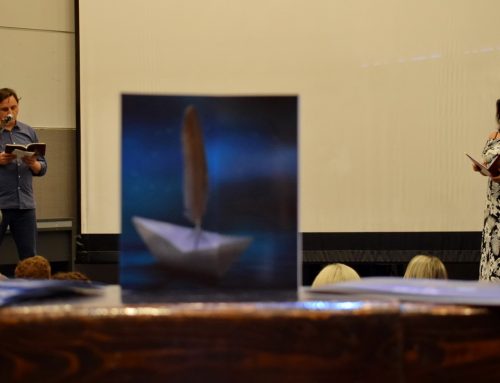The recipient of the “Golden Wreath” for 2019, the main award of the “Struga Poetry Evenings” is the Romanian poet Anna Blandiana. The decision was announced by the Managing Board and the Directorate of the “Struga Poetry Evenings” (SPE) festival at the ceremony held on March 21st in the Macedonian Academy of Sciences and Arts (MASA).
The award shall be bestowed to the laureate at the poetry reading “Bridges”, one of the central manifestations of this year’s edition of the festival, which will be held from 21 to 28 August 2019.
“One of the most esteemed contemporary European authors, Anna Blandiana, (pen name of Otilia Valeria Coman) is part of and representative of the 1960’s poet generation, which was the force behind the affirmation of the Modernism in Romanian literature and poetry.
The poetry of Blandiana does not flirt with the fashionable and superficially attractive writing, but is critical and sincerely concerned for the loss and the absence of freedom in this contemporary abyss, in the midst of which the humanity hangs perplexed…
As the reactions and echoes of the literary criticism in Europe argue, the creative work of Anna Blandiana is critical contribution to enriching the expressional capacities of the contemporary literature, as well as vital stimulus for the revitalization of its noble mission in a formidable time, such as ours“, emphasizes Elizabeta Sheleva, PhD, university professor and the president of the Managing Board of the “Struga Poetry Evenings”, one of the most prominent and oldest poetic festivals in the world.
The place that Anna Blandiana (born in Timișoara, Romania, in 1942), holds in the literary life of Romania can be compared with that of Anna Akhmatova in Russia or Václav Havel in the Czech Republic. She is highly acclaimed figure in Romanian literature and has written 17 books of poetry, two books of fantastic prose, nine books of essays and one novel. Her work has been translated into 25 languages and included into 80 books of poetry and prose to date.
Blandiana’s definitive debut took place in the sixties. She belongs to the generation of Romanian Neo-Modernists, was a prominent opponent of the regime of Nicolae Ceaușescu and her daring and honest songs, as well as her courageous stance in defense of the ethical values has turned her into a legendary figure in Romanian literature.
With a range of poetry books from 1966 to 1981, Blandiana established herself as one of the most prominent poets of her generation. She had become fruitful and much appreciated poet – winner of numerous awards, recognized by the Romanian academy and the Writers Union. In 1982, she became the youngest winner of the “Gottfried von Herder” Award from the University of Vienna.
In late December of 1984, Blandiana managed to circumvent the draconian censorship of the government and published a series of four songs – “The Children’s Crusade”, “I Believe”, “Delimitations” and “Everything” – in the avant-garde journal Amphitheatre. The distribution of the journal was cancelled, but handwritten copies of these poems continued to circulate clandestinely. They were, in fact, the first samizdat poems in Romanian literature, denouncing a political system that constantly falsified reality and destroyed human dignity. Reprisals against her were harsh, but she was saved by international solidarity and the backing of Italian and German intellectuals.
In the murky political panorama after 1989, Anna Blandiana became the symbol of hope. Just as she took it upon herself to denounce the human rights violations of Ceauşescu’s dictatorship, after 1989 she saw it as her duty to condemn the manipulation of democratic values by the new political power. And despite her intense civic engagement and participation in protest marches and rallies, she with almost mystical asceticism applied herself to writing and to the memory of the victims.
Blandiana resurrected the Romanian PEN Club (founded in 1924 and dissolved during the Communist period) and assumed its Presidency (1990-2004). This was the first institution to re-establish Romania’s position in the Western world.
In recognition of her contribution to European culture and her valiant fight for human rights, in 2009 Blandiana was awarded the highest distinction of the French Republic, the Légion d’Honneur, while the US State Department distinguished her with the Romanian Women of Courage Award in 2014. The Romanian King Michael of Romania awarded her the Royal decoration Nihil Sine Deo (2014).
She is also Doctor Honoris Causa at four Romanian Universities: Universitatea de Vest, Timișoara (2014), Cluj University (March 2015), Universitatea Dunărea de Jos Galați (2016), Universitatea “1 Decembrie 1918” Alba Iulia (2018).
According to the laureate, the “Golden Wreath” of SPE is much more significant than any other award and the news of this honor aroused fervid excitement in her, because her creative maturation was marked by this festival in the country, as she says, once trodden by Orpheus.
“I am not sure I know how to express the excitement I felt when I received the wonderful news that I will be awarded the Golden Wreath at Struga. In order to understand what I felt, you need to know that for me, a Romanian poet, this legendary wreath is more important than any other European Prize. And this is so not only because it’s one of the oldest literary prizes in the world, but because I grew up and became a poet under the nearly mythic aura of poetry festival on the Struga bridge and in the Ohrid Cathedral, and Nichita Stănescu’s crowning constituted the magical moment of my generation.
In a world in which wars, revolutions and the revision of history and geography have left little space for poetry, the Golden Wreath Award has endured for six decades at the watershed of centuries opposing the lyre and the laurels to all kinds of weapons, and countering all sorts of hatred with loving words. For fifty-eight years, the great poets of the world you selected have gratefully come to this land trodden by Orpheus, illuminated by the faith that beauty will save the world and that their presence may infuse the spirit of Europe with the form of the Struga Wreath”. says this year’s laureate of the Struga Poetry Evenings in her acceptance speech.









